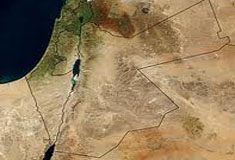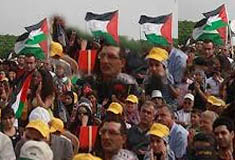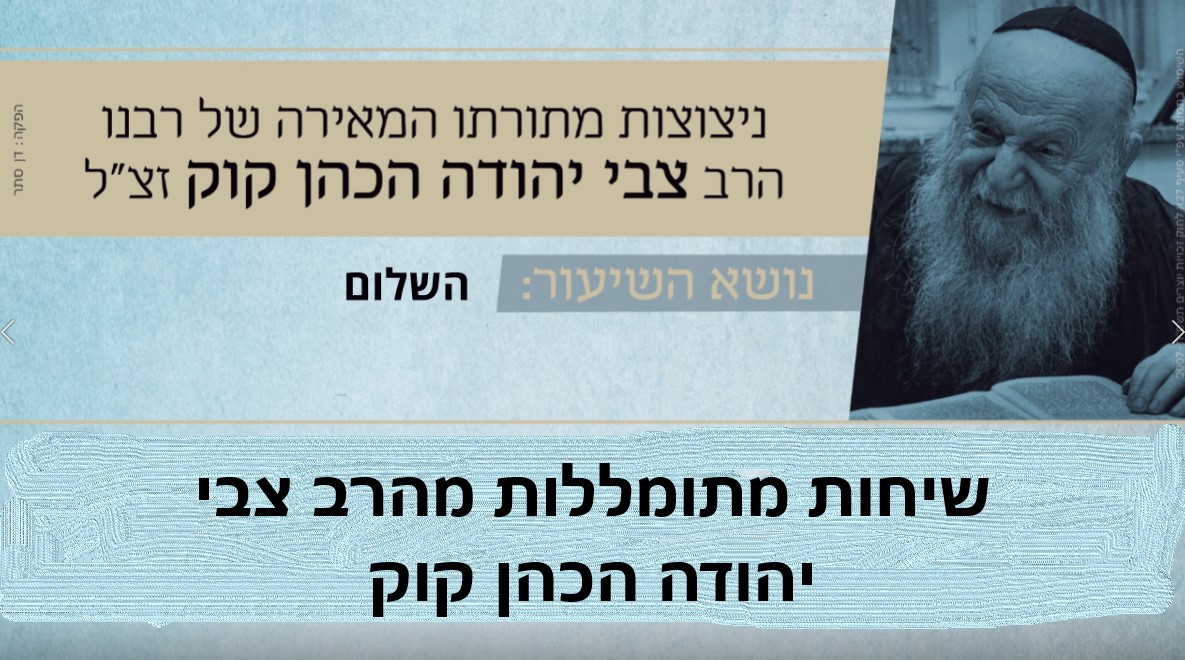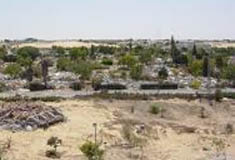Gaza: A Contested Territory in Jewish History
הרב שי טחןיז אדר ב, תשפד27/03/2024Is Gaza Within the Promised Land's Borders?
תגיות:עזהארץ ישראלהתיישבות
In Brit Ben Habetarim(פרשת לך לך) , Hashem promises Havraham Avinu the Land of Israel and delineates the northern and southern borders. The pasuk reads(בראשית טו, יח) : "On that day, Hashem made a covenant with Avram, saying, 'To your offspring, I have given this land, from the river of Egypt to the great river, the river Euphrates".
the Land of Israel and delineates the northern and southern borders. The pasuk reads(בראשית טו, יח) : "On that day, Hashem made a covenant with Avram, saying, 'To your offspring, I have given this land, from the river of Egypt to the great river, the river Euphrates".
These promises hold significant relevance to the first commentary by Rashi in the Torah. Rashi questions why Hashem commenced the Torah with the account of the creation of the world rather than immediately introducing the laws of the Torah. Rashi provides an insightful response, explaining that this was to convey a crucial message: by narrating the act of creation, Hashem asserts His ownership of the land and His authority in determining which nation inherits it.
Hashem's declaration serves as a powerful reminder that if the nations of the world accuse the people of Israel of theft and occupation, they can firmly retort that the entire world is Hashem's creation, and it is He who apportions the land.
Indeed, a valid question arises here: the nations may not be aware of what Rashi has articulated, and even if we were to convey this message to them, they might not pay heed. So, what purpose does Rashi's message serve? Rashi's message primarily serves the Jewish nation, reinforcing our own understanding that the land rightfully belongs to us, and we are not engaged in theft or occupation.
Once we internalize this message and firmly believe in our rights to the land, we can then effectively communicate this conviction to others. As long as we harbor doubts about our entitlement to the land, we will struggle to persuade others of its validity. However, when our belief is unwavering, it becomes a powerful catalyst for convincing others, as our conviction will resonate and influence those around us.
Is Gaza Within the Promised Land's Borders?
Returning to the previously mentioned pasuk, the "River of Egypt" in the promise to Avraham Avinu refers to the river situated to the south of the city of Gaza, indicating clearly that Gaza is within the borders of Israel, granted to the Jewish people from Hashem.
The same concept is reiterated several times in the Torah, as we can observe in other passages. For instance, when the Torah, in Parashat Masaey, delineates the precise borders of Eretz Israel, it defines the southern border going around from Azmon to the stream of Egypt. This, once again, underscores that Gaza is indeed within the borders of Hashem's gift to us.
May We Give Away Hashem's Gift for Peace Treaty?
Now that we understand that Hashem granted us the land, including Gaza, let's delve into another question that was highly relevant about 20 years ago. The issue of whether we are permitted to give land for the sake of peace became a contentious topic as it divided the people of Israel. Some believed that ceding the land of Gaza to the Palestinians would lead to peace and progress, while others viewed it as a grave danger, which eventually proved to be the case. This question also came before the poskim, who had to deliberate on whether we are allowed to relinquish Jewish land in pursuit of peace.
Chacham Ovadia Yosef spoke on various occasions and wrote a responsa(יביע אומר חלק יא חו״מ סימן כב) explaining that in a hypothetical situation where giving up land can save lives, it is permitted, as nothing is more vital than preserving life. The halacha states that in a situation where you can save a life, then the entire Torah is set aside (except for the three severe prohibitions). He also added that sometimes giving up land can be seen as weakness and allows the enemy the opportunity to strike at the small land of the Jewish people. Hence, he, along with many other rabbis, strongly believed that handing over Gaza to the Palestinians was a grave mistake that would result in extreme bloodshed. As history has shown, the rabbis' concerns were well-founded. Shortly after the Gaza area was transferred to the Palestinian authority, they initiated rocket attacks and various means of terrorizing their Jewish neighbors, culminating in the disastrous recent attack, which underscored that those who doubted the wisdom of the separation were mistaken.
When Will the Promised Land Be Complete?
Let's revisit the psukim mentioned above in Brit Ben Habetarim. The pasuk continues by promising Avraham Avinu the land of ten nations. However, Rashi(בראשית טו, יט) points out that only seven of them were granted to the Jewish nation. Rashi explains that the lands of Edom, Moav, and Amon were promised to be given in the future in the end of days.
The Rambam explicitly states (הלכות רוצח פ״ח ה״ד) that these three lands will be given to us in the end of days. However, the exact locations of these lands are not precisely known, as the rabbis (ירושלמי שביעית תחילת פ״ז)have debated over their specific locations.
Ohr Hachayim explains that these three nations, which will be conquered at the end of days, symbolize the nations that will gather to fight on the shores of our land and will be defeated by the Messiah. This pasuk provides significant encouragement in the current times, emphasizing the notion that the end of days is drawing near, as we witness nations amassing on the shores of Israel for a world-altering conflict.

These promises hold significant relevance to the first commentary by Rashi in the Torah. Rashi questions why Hashem commenced the Torah with the account of the creation of the world rather than immediately introducing the laws of the Torah. Rashi provides an insightful response, explaining that this was to convey a crucial message: by narrating the act of creation, Hashem asserts His ownership of the land and His authority in determining which nation inherits it.
Hashem's declaration serves as a powerful reminder that if the nations of the world accuse the people of Israel of theft and occupation, they can firmly retort that the entire world is Hashem's creation, and it is He who apportions the land.
Indeed, a valid question arises here: the nations may not be aware of what Rashi has articulated, and even if we were to convey this message to them, they might not pay heed. So, what purpose does Rashi's message serve? Rashi's message primarily serves the Jewish nation, reinforcing our own understanding that the land rightfully belongs to us, and we are not engaged in theft or occupation.
Once we internalize this message and firmly believe in our rights to the land, we can then effectively communicate this conviction to others. As long as we harbor doubts about our entitlement to the land, we will struggle to persuade others of its validity. However, when our belief is unwavering, it becomes a powerful catalyst for convincing others, as our conviction will resonate and influence those around us.
Is Gaza Within the Promised Land's Borders?
Returning to the previously mentioned pasuk, the "River of Egypt" in the promise to Avraham Avinu refers to the river situated to the south of the city of Gaza, indicating clearly that Gaza is within the borders of Israel, granted to the Jewish people from Hashem.
The same concept is reiterated several times in the Torah, as we can observe in other passages. For instance, when the Torah, in Parashat Masaey, delineates the precise borders of Eretz Israel, it defines the southern border going around from Azmon to the stream of Egypt. This, once again, underscores that Gaza is indeed within the borders of Hashem's gift to us.
May We Give Away Hashem's Gift for Peace Treaty?
Now that we understand that Hashem granted us the land, including Gaza, let's delve into another question that was highly relevant about 20 years ago. The issue of whether we are permitted to give land for the sake of peace became a contentious topic as it divided the people of Israel. Some believed that ceding the land of Gaza to the Palestinians would lead to peace and progress, while others viewed it as a grave danger, which eventually proved to be the case. This question also came before the poskim, who had to deliberate on whether we are allowed to relinquish Jewish land in pursuit of peace.
Chacham Ovadia Yosef spoke on various occasions and wrote a responsa(יביע אומר חלק יא חו״מ סימן כב) explaining that in a hypothetical situation where giving up land can save lives, it is permitted, as nothing is more vital than preserving life. The halacha states that in a situation where you can save a life, then the entire Torah is set aside (except for the three severe prohibitions). He also added that sometimes giving up land can be seen as weakness and allows the enemy the opportunity to strike at the small land of the Jewish people. Hence, he, along with many other rabbis, strongly believed that handing over Gaza to the Palestinians was a grave mistake that would result in extreme bloodshed. As history has shown, the rabbis' concerns were well-founded. Shortly after the Gaza area was transferred to the Palestinian authority, they initiated rocket attacks and various means of terrorizing their Jewish neighbors, culminating in the disastrous recent attack, which underscored that those who doubted the wisdom of the separation were mistaken.
When Will the Promised Land Be Complete?
Let's revisit the psukim mentioned above in Brit Ben Habetarim. The pasuk continues by promising Avraham Avinu the land of ten nations. However, Rashi(בראשית טו, יט) points out that only seven of them were granted to the Jewish nation. Rashi explains that the lands of Edom, Moav, and Amon were promised to be given in the future in the end of days.
The Rambam explicitly states (הלכות רוצח פ״ח ה״ד) that these three lands will be given to us in the end of days. However, the exact locations of these lands are not precisely known, as the rabbis (ירושלמי שביעית תחילת פ״ז)have debated over their specific locations.
Ohr Hachayim explains that these three nations, which will be conquered at the end of days, symbolize the nations that will gather to fight on the shores of our land and will be defeated by the Messiah. This pasuk provides significant encouragement in the current times, emphasizing the notion that the end of days is drawing near, as we witness nations amassing on the shores of Israel for a world-altering conflict.
הוסף תגובה
עוד מהרב שי טחן
עוד בנושא פוליטיקה






